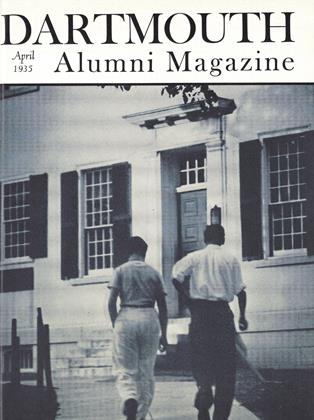The vast majority of undergraduatesstand on firm ground. They are not reactionaries. They realize the failings of the present and the need for change of a sort. As to the exact nature of what these improvements should be, we know no more than anyone else. But I cannot help feeling that the college conservatives will be intimately identified with such changes, and provide both balance and limitations. 1 am tired of reading about noisesome "youth" conventions, usually held at C.C.N.Y., where it is "Resolved: That the older generation has failed us and we, the new generation, must find a way out." The older generation has not failed us. They have carried on. And so shall we. And even if flaws in our processes of production and distribution remain hidden until the end of time, better occasional recessions than to forego an economic system which has brought material well-being in undreamed of munificence and more so than any alternative theory can promise, has ever preserved and held high the cardinal virtues of freedom, equality, and liberty.
By George H. Col ton '35 President of Palaeopitus,Senior Fellow
DURING THE PAST twelve months Dartmouth has made several steps toward greater student responsibility for undergraduate conduct. These steps were originally prompted by suggestions and attitudes of the students themselves, and later furthered and supported by the Administration. At the present time the first line of control rests squarely upon students, in dormitories, fraternities, and during house parties.
The policy received its start just before the 1934 Carnival, when Palaeopitus drafted a plan to remove certain arbitrary and distasteful conditions that had grown out of the parties that had recently been held. Their idea was simply this: that the students were bound by very strict and inexpedient rules during parties. That fact invited breaches of the rules, and a general feeling of irresponsibility. Palaeopitus felt that the students wanted good parties and were capable of holding them under their own supervision.
Hence, Carnival was run without Administration police and, with all fraternities cooperating, under certain agreed rules to keep conduct within bounds considered to be gentlemanly. Palaeopitus bore the brunt of the work and went from house to house endeavoring to promote a standard of good conduct.
The result of the party and the control was eminently successful, and it was consequently decided that spring House Parties should be revived under the same system. This was done and carried out satisfactorily.
Last fall student control was extended to dormitories and fraternities. It was only after considerable planning and consideration that this step was taken, but it was believed that conditions warranted at least an attempt to promote the general principles embodied in student house party control.
Leaders in Student Affairs at DartmouthLeft, Thomas H. Lane Jr. '35, of Hartford, Conn., editor-in-chief of The Dartmouth for 1934"35> who makes a plea for college conservatives, and George H. Colton '35, of Spring- field, Mass., president of Palaeopitus, Senior Fellow and varsity football manager, who defends the new student-control plan.
Leaders in Student Affairs at DartmouthLeft, Thomas H. Lane Jr. '35, of Hartford, Conn., editor-in-chief of The Dartmouth for 1934"35> who makes a plea for college conservatives, and George H. Colton '35, of Spring- field, Mass., president of Palaeopitus, Senior Fellow and varsity football manager, who defends the new student-control plan.
 View Full Issue
View Full Issue
More From This Issue
-
 Article
ArticleHANOVER BROWSING
April 1935 By Herbert F. West '22 -
 Article
ArticleSTABILIZATION BY SPECIE PAYMENTS
April 1935 By Edward Tuck '62 -
 Class Notes
Class NotesClass of 1908
April 1935 By L. W. Griswold -
 Class Notes
Class NotesClass of 1910
April 1935 By Harold P. Hinman -
 Class Notes
Class NotesClass of 1918
April 1935 By Allan C. Gottschaldt -
 Class Notes
Class NotesClass of 1929
April 1935 By F. William Andres
Article
-
 Article
ArticleDRAMATIC CLUB CASTE
February, 1912 -
 Article
ArticleTHE FACULTY
APRIL 1959 By HAROLD L. BOND '42 -
 Article
ArticleHow Can a Computer Make Music?
SEPTEMBER 1987 By Jon Appleton -
 Article
ArticleThe Story of Buster Jig
December 1988 By R.H.N. -
 Article
ArticleSenior hockey: through the golden years on silver blades
November 1982 By Steve Farnsworth '83 -
 Article
ArticleTHE STORY OF DARTMOUTH
December, 1914 By Wilder Dwight Quint, J. K. LORD


